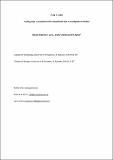Files in this item
Living in stable social groups is associated with reduced brain size in woodpeckers (Picidae)
Item metadata
| dc.contributor.author | Fedorova, Natalia | |
| dc.contributor.author | Evans, Cara L. | |
| dc.contributor.author | Byrne, Richard W. | |
| dc.date.accessioned | 2018-03-09T00:33:10Z | |
| dc.date.available | 2018-03-09T00:33:10Z | |
| dc.date.issued | 2017-03 | |
| dc.identifier | 249229371 | |
| dc.identifier | 64d2d5ad-deff-4553-8fbc-d73b2e4b19f5 | |
| dc.identifier | 85017387062 | |
| dc.identifier | 000398960000014 | |
| dc.identifier.citation | Fedorova , N , Evans , C L & Byrne , R W 2017 , ' Living in stable social groups is associated with reduced brain size in woodpeckers ( Picidae ) ' , Biology Letters , vol. 13 , no. 3 , 20170008 . https://doi.org/10.1098/rsbl.2017.0008 | en |
| dc.identifier.issn | 1744-9561 | |
| dc.identifier.other | ORCID: /0000-0001-9862-9373/work/60630517 | |
| dc.identifier.uri | https://hdl.handle.net/10023/12883 | |
| dc.description | NF was supported by University of St Andrews undergraduate research assistantship program, and CLE was supported by a BBSRC studentship. | en |
| dc.description.abstract | Group size predicts brain size in primates and some other mammal groups, but no such relationship has been found in birds. Instead, stable pair-bonding and bi-parental care have been identified as correlates of larger brains in birds. We investigated the relationship between brain size and social system within the family Picidae, using phylogenetically controlled regression analysis. We found no specific effect of duration or strength of pair bonds, but brain sizes were systematically smaller in species living in long-lasting social groups of larger sizes. Group living may only present a cognitive challenge in groups in which members have individually competitive relationships; we therefore propose that groups functioning for cooperative benefit may allow disinvestment in expensive brain tissue. | |
| dc.format.extent | 4 | |
| dc.format.extent | 623470 | |
| dc.language.iso | eng | |
| dc.relation.ispartof | Biology Letters | en |
| dc.subject | Social intelligence theory | en |
| dc.subject | Social complexity | en |
| dc.subject | Group size | en |
| dc.subject | Brain evolution | en |
| dc.subject | BF Psychology | en |
| dc.subject | QL Zoology | en |
| dc.subject | DAS | en |
| dc.subject.lcc | BF | en |
| dc.subject.lcc | QL | en |
| dc.title | Living in stable social groups is associated with reduced brain size in woodpeckers (Picidae) | en |
| dc.type | Journal article | en |
| dc.contributor.institution | University of St Andrews. School of Biology | en |
| dc.contributor.institution | University of St Andrews. School of Psychology and Neuroscience | en |
| dc.contributor.institution | University of St Andrews. Centre for Social Learning & Cognitive Evolution | en |
| dc.identifier.doi | 10.1098/rsbl.2017.0008 | |
| dc.description.status | Peer reviewed | en |
| dc.date.embargoedUntil | 2018-03-08 | |
| dc.identifier.url | http://rsbl.royalsocietypublishing.org/content/13/3/20170008.article-info | en |
This item appears in the following Collection(s)
Items in the St Andrews Research Repository are protected by copyright, with all rights reserved, unless otherwise indicated.

